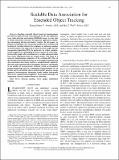Scalable Data Association for Extended Object Tracking
Author(s)
Meyer, Florian; Win, Moe Z
DownloadPublished version (1.480Mb)
Publisher with Creative Commons License
Publisher with Creative Commons License
Creative Commons Attribution
Terms of use
Metadata
Show full item recordAbstract
Tracking extended objects based on measurements provided by light detection and ranging (LIDAR) and millimeter wave radio detection and ranging (RADAR) sensors is a key task to obtain situational awareness in important applications including autonomous driving and indoor robotics. In this paper, we propose probabilistic data association methods for localizing and tracking of extended objects that originate an unknown number of measurements. Our approach is based on factor graphs and the sum-product algorithm (SPA). In particular, we reduce computational complexity in a principled manner by means of 'stretching' factors in the graph. After stretching, new variable and factor nodes have lower dimensions than the original nodes. This leads to a reduced computational complexity of the resulting SPA. One of the introduced methods is based on an overcomplete description of data association uncertainty and has a computational complexity that only scales quadratically in the number of objects and linearly in the number of measurements. Without relying on suboptimal preprocessing steps such as a clustering of measurements, it can localize and track multiple objects that potentially generate a large number of measurements. Simulation results confirm that despite their lower computational complexity, the proposed methods can outperform reference methods based on clustering.
Date issued
2020Department
Massachusetts Institute of Technology. Laboratory for Information and Decision SystemsJournal
IEEE Transactions on Signal and Information Processing over Networks
Publisher
Institute of Electrical and Electronics Engineers (IEEE)